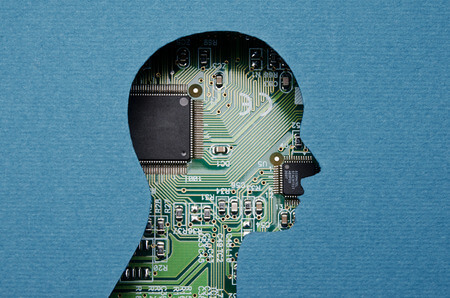Depending on how you feel about technology, there are either exciting efficiencies ahead or the robot apocalypse is coming. Either way, artificial intelligence is making its way into the workplace in a variety of ways, with chatbots in areas ranging from HR to customer service and programs that can predict which employees are most likely to leave the company. Here’s a look at what will be impacted:
What’s changing?
- Hiring
Many large companies now use an Applicant Tracking System to quickly sift through resumes for relevant keywords. New technology takes this a step further by learning from input of job descriptions and resumes, and then ranking candidates according to suitability for the job (the recruiter can then adjust the rankings so the system continues to learn).
Another way that AI can influence hiring is by searching for passive candidates. It searches public forums for factors the company is looking for (job titles, military service, etc.), and, once again, will learn based on feedback the hiring manager provides.
- Support
There is increasing pressure on businesses to be available to customers 24/7—Desk.com found that 22% of millennials expect a response from a brand within 10 minutes of reaching out. Chatbots are clearly the answer to this (it is estimated than 85% of the interactions with customers will be carried out without human beings by 2020), but their use can go far beyond customer support. Some companies are experimenting having chatbots in HR available to answer frequently asked questions. Not only does this provide more timely service for employees, but the company can track which questions are being asked most often, and revise training materials in order to ensure that subject is covered. The chatbot can also send out reminders about benefits or deadlines the employee may not be aware of.
For a look at just how effective chatbots can be, take a look at another field: teaching assistants at universities. Georgia Institute of Technology implemented Jill Watson, a teaching assistant powered by IBM’s Watson, and found she was about to answer 40% of students’ questions. In fact, she was nominated as an outstanding TA before students found out she was a chatbot.
- Worker Productivity
This is an area where people may start to panic: AI can track how employees employees spend their day, and use this to address problems. One company, Veriato, logs web browsing, chat, keystrokes and document use, then sends the data to AI systems for processing. The AI can then point out suspicious behavior like copying contacts, repeated failed password attempts, or plain old time-wasting behaviors like hours spent shopping online. Another service, Bluvision, is incorporated into employee badges and literally tracks how much time workers spend at their desks, in break rooms, etc. (the data is only delivered in aggregate and does not show an individual’s movements). Managers can then address the patterns with employees.
The technology can be preventative as well. By analyzing a variety of factors (attrition under certain managers, time since last promotion), the AI can also determine, with surprising accuracy, when an employee is unhappy and likely to leave, so that the company can attempt to intervene.
So, will I still have a job?
Almost definitely—although it may not look the same after AI is introduced. Most jobs can’t be completely automated—workers will simply shift focus to other parts of their job. In fact, some research points to a positive relationship between new technology and more jobs—so AI may actually create employment. Aaron Levie, CEO of Box quoted in a Quartz article, explained, “AI can seem dystopian, because it’s easier to describe existing jobs disappearing than to imagine industries that never existed appearing.”
That said, professional development on the job will become more important than ever. Workers will need to learn new skills to adapt to changing technology and adjust their responsibilities. But, while AI is great at identifying patterns, it is usually working with incomplete data, and may jump to hasty conclusions (for example, hiring AI may be biased towards those with a more significant digital presence). Businesses will absolutely still need humans for strategic, creative and managing roles. Artificial Intelligence is certainly making exciting leaps, but only time will tell its true impact.
Need to Find Qualified Employees?
If your company is in search of skilled employees, contact The HT Group here:
Like what you read?
Subscribe to our newsletter for more!
Copyright: pogonici / 123RF Stock Photo




